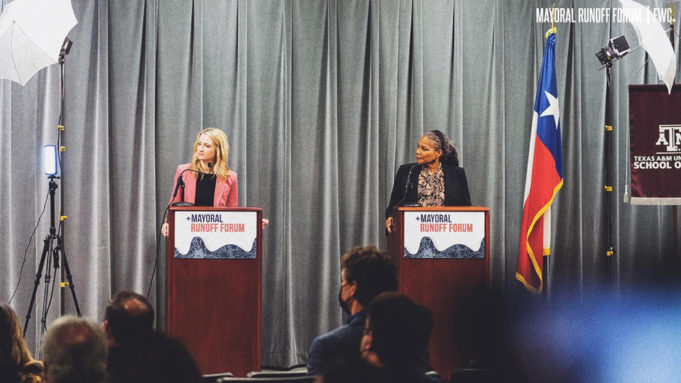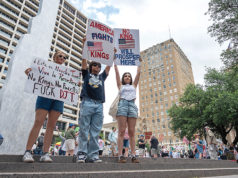“This campaign is about focusing on issues that will take [Fort Worth] into the next 10, 20, 30 years,” said Deborah Peoples, one of two candidates for Fort Worth mayor. “We want to put this city back in the hands of the people who love it.”
Speaking to around two dozen volunteers at Chisholm Trail Park in South Fort Worth on Saturday, Peoples answered questions from canvassers before they set out to block walk. One volunteer asked Peoples how to respond to residents who have concerns about city accountability and transparency.
“Our plan is to stop dark money lobbying within my first 100 days in office,” Peoples responded, echoing her public commitment to ending the ability of lobbying groups to avoid public scrutiny by not registering.
A cursory look at the websites of Dallas, Austin, Houston, and San Antonio shows that Fort Worth is the largest Texas city that does not have a system in place to register outside lobbying groups. A city spokesperson confirmed that the City of Fort Worth does not require outside lobbyists to register with the city. Put simply, local taxpayers and media outlets have no way of knowing how much influence outside money is having on city dealings. Elected officials are required to disclose campaign contributions, but lobbying can encompass a wide range of legal but ethically precarious gifts, such as a comped dinner or free tickets to an event.
Even when significant contributions aren’t flowing from special interests to city officials, the often unfettered access to city officials that lobbyists enjoy undermines the democratic process by allowing private companies to influence how public funds and resources are directed.
Lobbying groups spent around $3.5 billion to influence local, state, and federal elected officials across the country in 2020, according to the market and consumer data group Statista.
In 2009, Dallas City Council passed an ordinance that required lobbyists to pay a registration fee and to abide by quarterly disclosure statements. Lobbying groups in Dallas are prohibited from making campaign contributions to city councilmembers within certain periods of time before zoning cases are heard and contract bids are reviewed.
If Fort Worth had the type of lobbying disclosure requirements that Dallas has, we may not have a city councilmember, and recent mayoral candidate, whose campaign contributions are tied to tens of millions in city contracts (“ City Contracts Worth Tens of Millions Tied to Brian Byrd Campaign Contributions,”April 20). Fort Worth leaders appear to be in no rush to increase transparency over lobbyist dealings. It was just last month that one city official committed to improving public accessibility to the list of lobbying groups that have been and are currently hired by the city (“ City Official Promises Better Transparency with Lobbyist Dealings,” April 26).
Transparency over lobbyist dealings matters, especially now, because one of two candidates for mayor, Mattie Parker, has close family ties to Longbow Associates, an Austin-based government lobbying firm. Parker’s husband, David Parker, is a director at the firm.
In an email, Parker told us that Longbow Partners will have “no arrangements with the City of Fort Worth” if she is elected in the runoff on Saturday, June 5, to lead Fort Worth.
Speaking at a recent Facebook Live debate that was sponsored by the Fort Worth Chamber of Commerce, Peoples brought up dark money lobbying.
“I’m unveiling a plan to end dark money lobbying in Fort Worth,” she said. “We can’t lower taxes and do some of these things without knowing who is influencing the money at City Hall. Mattie, I hope you would agree.”
That’s an easy change, Parker replied.
“Texas Ethics Commission” handles the registration of state lobbyists, Parker said. “Just do the same thing in Fort Worth.”
Parker’s response is far from a ringing endorsement of Peoples’ commitment to ending dark money lobbying in Fort Worth, but, while Parker dodged Peoples’ request to join her 100-day pledge, both candidates are now on the record in support of requiring special interest groups to disclose their local lobbying efforts. Dark money lobbying is tied to a broader national push to eliminate the influence of undisclosed special interest in local, state, and federal elections.
Nearly 40 Senate Democrats recently sent an open letter to Treasury Secretary Janet Yellen and Internal Revenue Service Commissioner Charles Rettig that demanded greater transparency in how some nonprofits use disclosure loopholes when making political donations.
“This policy weakens federal tax laws, campaign finance laws, and longstanding efforts to prevent foreign interference in U.S. elections,” the lawmakers said.
Dark money campaign contributions topped $1 billion in 2020, according to the nonpartisan Center for Responsive Politics, and Democrats were the recipient of more than $500 million of those unregistered donations. Biden’s 2020 White House bid benefited from $145 million in dark money donations, according to The Washington Post.
Through his campaign website, Biden pledged to propose legislation that would require all candidates for federal office to disclose contributors.
“No more hiding behind ‘dark money’ groups to spread lies,” Biden’s website reads.
For as long as the Weekly has been following local politics (25 years for anyone who’s counting), important City Hall decisions have largely been made behind closed doors before ceremonial votes are cast at city council meeting or private executive sessions. Dark money lobbying is part of the “Fort Worth Way” of doing things. The influence of big money on local politics won’t disappear anytime soon, but the lack of public disclosure of outside lobbying groups has become arguably the most glaring example of unethical city dealings in Fort Worth. The issue of dark money lobbying might finally be addressed in about 100 days — perhaps depending on who is elected mayor.













REALLY BIG THANKS for the article …….”Fort Worth is the largest Texas city that does not require outside lobbyists to publicly register, so what are our two mayoral candidates going to do about it?”
Appreciate this type of info before an election. I get my ONE COPY at the FW library. Haven’t be impressed by Peoples leadership in the party…..BUT this made a difference in my voting. NOTE:
My first election was when I had turned 21 and watched Gov. A. Stevenson with my dad on TV. Wrote him a note that I was sorry he didn’t win and, got back a ‘thank you’ note.
Great article. Thank you for writing this.